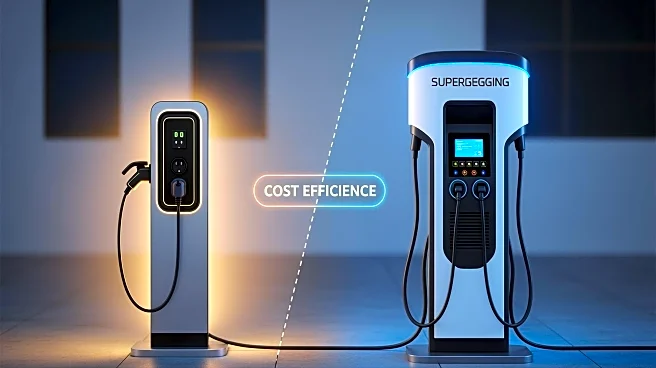What's Happening?
A Tesla owner has revealed the significant cost difference between charging an electric vehicle (EV) at home versus using Tesla's Supercharger stations. According to a discussion on the TeslaLounge subreddit,
home charging costs approximately $0.15 per kWh, while Supercharging costs around $0.35 per kWh. This translates to a full charge costing $12.30 at home compared to $28.70 at a Supercharger. Despite the higher cost, Superchargers offer faster charging times. The owner noted that even with the higher Supercharging costs, EVs remain cheaper than gasoline-powered vehicles over time. Another Tesla owner shared that after driving 144,000 miles over six years, he saved at least $20,000 compared to what he would have spent on a gas car.
Why It's Important?
The cost disparity between home charging and Supercharging is crucial for consumers considering the switch to electric vehicles. While Superchargers provide convenience and speed, the higher costs could impact the overall savings associated with EV ownership. This information is vital for potential EV buyers who need to weigh the long-term financial benefits against the immediate costs of charging infrastructure. The discussion also highlights the ongoing debate about the cost-effectiveness of EVs compared to traditional vehicles, influencing consumer decisions and potentially driving policy changes in energy pricing and infrastructure development.
What's Next?
As the EV market continues to grow, consumers may demand more affordable and efficient charging solutions. This could lead to increased investment in home charging technologies and infrastructure improvements to reduce costs. Additionally, automakers and energy providers might explore partnerships to offer bundled services that make EV ownership more attractive. Policymakers could also consider incentives or subsidies to encourage the adoption of home charging systems, further reducing the financial burden on consumers.
Beyond the Headlines
The discussion around charging costs also touches on broader environmental and economic implications. As more consumers switch to EVs, the demand for electricity will rise, potentially impacting energy grids and necessitating advancements in renewable energy sources. The shift could also influence oil markets and drive innovation in battery technology, leading to more sustainable transportation solutions.









